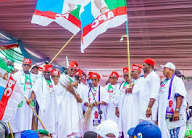United States Announces Revised Visa Reciprocity Policy for Nigeria
The United States government has introduced a new visa reciprocity policy for Nigeria, significantly altering the terms under which non-immigrant and non-diplomatic visas are issued to Nigerian citizens.
Effective July 8, 2025, most Nigerian applicants will now be granted single-entry visas valid for only three months.
The U.S. Embassy in Abuja confirmed the development on Monday, stating that the decision is part of a global policy based on reciprocity.
Under this policy, the U.S. adjusts its visa terms to reflect how American citizens are treated by foreign governments, including Nigeria.
In a statement released by the U.S. Mission in Nigeria, the Embassy explained that “U.S. law requires the Department of State to adjust visa validity periods and application fees to match the treatment of U.S. citizens by foreign governments.”
The embassy emphasized that this is not a punitive measure but rather an alignment of standards, as Nigeria currently issues short-term visas to U.S. citizens under similar conditions.
According to the new policy, all newly issued non-immigrant visas from July 8 onward will be limited to a single entry with a maximum validity of three months.
However, the U.S. clarified that this change will not affect previously issued visas. Nigerians who obtained multiple-entry visas before the effective date can still use them under their original terms until expiry.
Visa categories impacted by the new directive include business, tourism, academic, and short-term cultural exchange visas. Diplomatic and official visas are not affected by the changes.
The U.S. Embassy noted that while the decision reflects the current state of visa issuance practices in Nigeria, the policy remains subject to ongoing review. It also outlined three key areas in which Nigeria must show continued improvement to potentially restore longer visa validity and multiple-entry privileges: enhanced travel document security, improved visa-overstay tracking, and increased cooperation in sharing criminal and terrorist information.
Despite the restrictive nature of the update, the U.S. Mission praised recent efforts by the Nigerian Immigration Service and security agencies to improve immigration standards.
The embassy said it looks forward to continued collaboration with the Nigerian government on improving systems that support legitimate travel and international partnerships.
The announcement has triggered widespread reactions from Nigerians, particularly frequent travelers, students, and business people, many of whom see the policy shift as a setback.
Travel and immigration analysts have also called on the Nigerian government to urgently review its own visa policies for U.S. citizens to foster mutual diplomatic understanding and restore previous privileges.
The U.S. government reiterated its commitment to fostering strong ties with Nigeria, particularly in areas of education, culture, and people-to-people exchange, adding that it will continue to work closely with Nigerian authorities to improve bilateral travel conditions.







